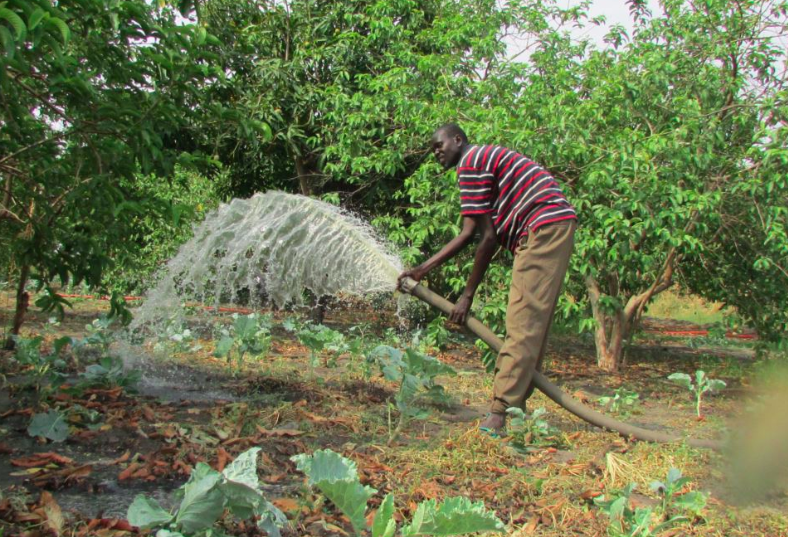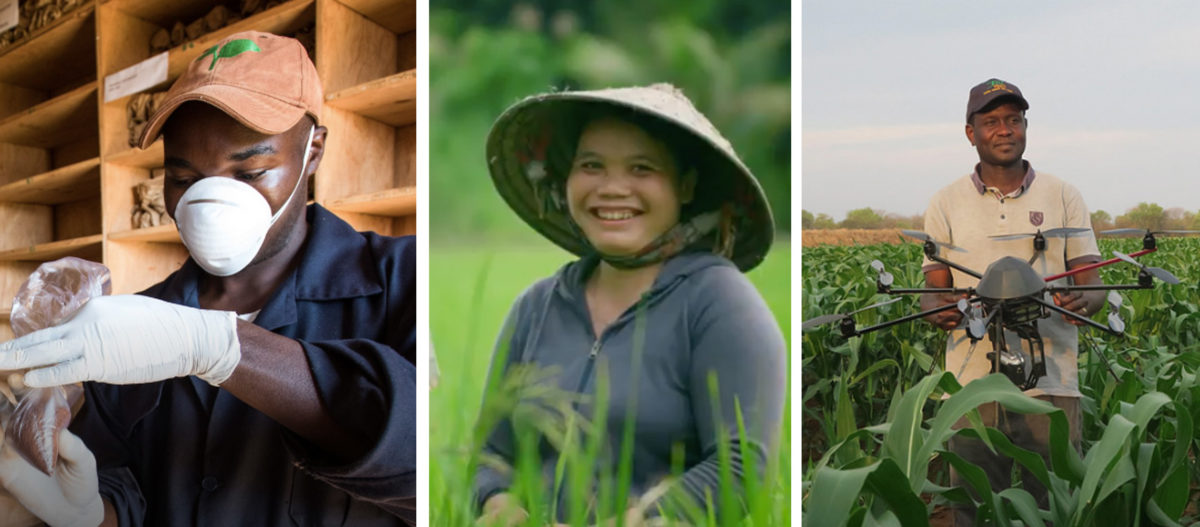As demand for food grows, we need to ensure the way we produce it remains as environmentally sound as possible. Farmers can now be guided by technology, to use earth’s resources like land and water in the most efficient way. It can also help them apply vital inputs like crop protection and fertilizer in the right amounts. This is called precision agriculture, and here 10 ways Farming First supporters are putting it to good use.
1. iDE: Empowering Farmers with Money and Time-saving Technology
In Ghana, farmer Alalee Francis is testing out a drip irrigation kit from iDE.As part of iDE’s Innovation for Rural Prosperity, he is testing which approaches of watering and planting are best by trying several methods next to each other. Along with other farmers in the region, he is learning new techniques, observing how they work, and then practicing the best methods on his own farms. This reduces the amount of water needed and increases yields for everyone. “I used to make about 200 cedis from a growing season, and now I make up to 400 – 500 cedis,” Alalee reports. Alalee spends his new income on school fees for his children, healthcare, and better food for his family of five. Read more >>
2. Digital Globe: Satellite Technology Helps Evaluate Agricultural Tradeoffs
Women smallholder farmers face tradeoffs every day because of a lack of resources, financial credit, and other social and familial commitments. Satellite technology from Digital Globe helps farmers evaluate these tradeoffs and make judgements about what they can expect from their farming activity. Access to image data can give smallholder farmers valuable knowledge on crop yields and crop health as well as useful information about their agricultural context, such as road infrastructure and weather. Read more >>
3. Fintrac: A Doctor for Soils
Doctors are not just for human health – they can help diagnose problems with soils and prescribe the correct treatment to help nourish and repair them. This initiative from Fintrac provides smallholder farmers with analysis so that their soil can be matched with an appropriate fertilizer for its specific health needs. Mary Afande Lwaka in Kenya had been using fertilizer, but soil analysis showed that using lime would increase her soil health, benefitting her crop yields immensely. Farmers participating in the Soil Doctor project have seen their yields increase from between 40 – 150 percent. Read more >>

4. Chemonics: Connecting Village Farmers to Space and the Wider World
Villagers in the developing world can be some of the hardest hit by extreme weather. This initiative from NASA and USAID helps farmers have access to earth-observing technologies so they can mitigate against extreme weather caused by climate change, understanding their ecosystems better and the local context in which they operate. Access to this data also enables local governments and NGOs to make accurate land assessments and provide assistance to climate-related disasters, such as flooding and drought. Read more >>
5. Technoserve: Eyes in the Skies Help Farmers Perform at their Best on the Ground
In Africa, aerial mapping and measurement technologies hold immense potential to improve decision-making in every sector of the economy. The value of geo-intelligence services in the region is projected to triple from $40 million in 2012 to $150 million by 2020. This project analysed the benefits of applying drone technology to farming in Uganda. Farmers’ profits were projected to increase by over $2,000 per farm within a year due to better support offered by the agribusiness using insights from drone flights. Read more >>
6. One Acre Fund: Sending in the Soil Experts
In Kakamega, Kenya, lab assistants have a week to analyse 3000 soil samples that arrive from Rwanda before more are sent over. With the data from these soil testing kits, assistants can measure the precise make-up of their clients’ soils and evaluate which fertilizers, seeds, and agronomic practices work best for their type of land. This increases agricultural production and the amount of food available for farmers to eat or export. Read more >>
7. CropLife International: Training Farmers to Tackle Pests Responsibly
Phan Anh Tu trains farmers in the Mekong Delta in Vietnam so that they can spray their crops with necessary pesticides when suffering from pest infestations. Training which focuses on applying the right type of pesticide, at the right time in the right dose and in the right way ensures that the pesticides are not overused and promotes good crop health. Read more >>
8. IPNI: Calculating Nitrogen Removal in Crops
With this simple app, farmers all over the world can learn to have a more scientific approach to their farming. IPNI’s crop nutrient calculator enables farmers to measure the rate of nitrogen removal for their crops. Results are personal and based on yield goals that are inputted by the user. There is already a wide variety of crops are available on the calculator and IPNI plans to continually expand the list over time. (Update: IPNI ceased operating in April 2019.) Read more >>
9. Saillog: Using AI to Identify Pests & Disease
Crop diseases are a farmer’s worst nightmare. But this application makes diagnosis much easier through the use of artificial intelligence-based technology. This free interactive smartphone app uses algorithms to identify problems with crops. Farmers can upload photos of their crops and receive analysis on their health and request advice on any treatment required. Read more >>
10. Malabo-Montpellier Panel: Why Technology is Critical for Advancing African Agriculture
In its latest report “Mechanized”, the Malabo Montpellier Panel explores the technologies that why can help farmers in Africa boost their yields, while adding the additional benefits of improved nutrition, greater employment opportunities, and advancement towards global food security. Precision agriculture technologies feature as a key component. Read more >>




Comments
Insightful read! Precision agriculture boosts efficiency, sustainability, and global impact in farming. Impressive technological integration!